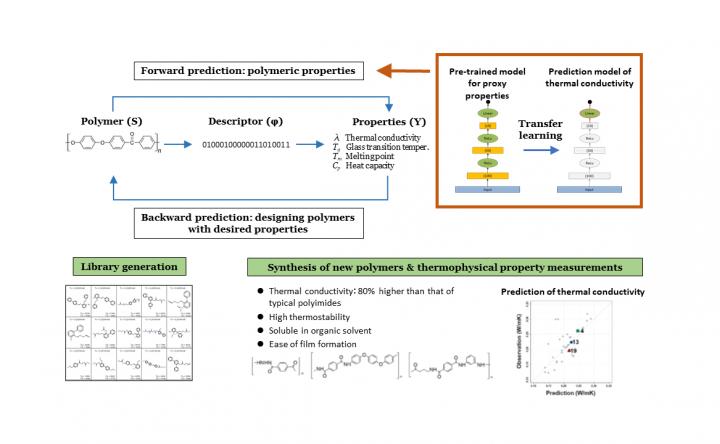
Credit: npj Computational Materials, Ryo Yoshida, Junko Morikawa
A joint research group including Ryo Yoshida (Professor and Director of the Data Science Center for Creative Design and Manufacturing at the Institute of Statistical Mathematics [ISM], Research Organization of Information and Systems), Junko Morikawa (Professor at the School of Materials and Chemical Technology, Tokyo Institute of Technology [Tokyo Tech]), and Yibin Xu (Group Leader of Thermal Management and Thermoelectric Materials Group, Center for Materials Research by Information Integration, Research and Services Division of Materials Data and Integrated System [MaDIS], NIMS) has demonstrated the promising application of machine learning (ML) — a form of AI that enables computers to “learn” from given data — for discovering innovative materials.
Reporting their findings in the open-access journal npj Computational Materials, the researchers show that their ML method, involving “transfer learning”, enables the discovery of materials with desired properties even from an exceeding small data set.
The study drew on a data set of polymeric properties from PoLyInfo, the largest database of polymers in the world housed at NIMS. Despite its huge size, PoLyInfo has a limited amount of data on the heat transfer properties of polymers. To predict the heat transfer properties from the given limited data, ML models on proxy properties were pre-trained where sufficient data were available on the related tasks; these pre-trained models captured common features relevant to the target task. Re-purposing such machine-acquired features on the target task yielded outstanding prediction performance even with the exceedingly small datasets, as if highly experienced human experts can make rational inferences even for considerably less experienced tasks. The team combined this model with a specially designed ML algorithm for computational molecular design, which is called the iQSPR algorithm previously developed by Yoshida and his colleagues. Applying this technique enabled the identification of thousands of promising “virtual” polymers.
From this large pool of candidates, three polymers were selected based on their ease of synthesis and processing.
Tests confirmed that the new polymers have a high thermal conductivity of up to 0.41 Watts per meter-Kelvin (W/mK). This figure is 80 percent higher than that of typical polyimides, a group of commonly used polymers that have been mass-produced since the 1950s for applications ranging from fuel cells to cookware.
By verifying the heat transfer properties of the computationally designed polymers, the study represents a key breakthrough for fast, cost-effective, ML-supported methods for materials design. It also demonstrates the team’s combined expertise in data science, organic synthesis and advanced measurement technologies.
Yoshida comments that many aspects remain to be explored, such as “training” computational systems to work with limited data by adding more suitable descriptors. “Machine learning for polymer or soft material design is a challenging but promising field as these materials have properties that differ from metals and ceramics, and are not yet fully predicted by the existing theories,” he says.
The study is a starting point for the discovery of other innovative materials, as Morikawa adds: “We would like to try to create an ML-driven high-throughput computational system to design next-generation soft materials for applications going beyond the 5G era. Through our project, we aim to pursue not only the development of materials informatics but also contribute to fundamental advancement of materials science, especially in the field of phonon engineering.”
###
This work was conducted as part of the “Materials Research by Information Integration” Initiative (MI2I), an open innovation accelerator selected by the Japan Science and Technology Agency (JST) as a support program for starting up innovation hub and implemented by NIMS.
Media Contact
Kazuhide Hasegawa
[email protected]
Original Source
https:/
Related Journal Article
http://dx.



